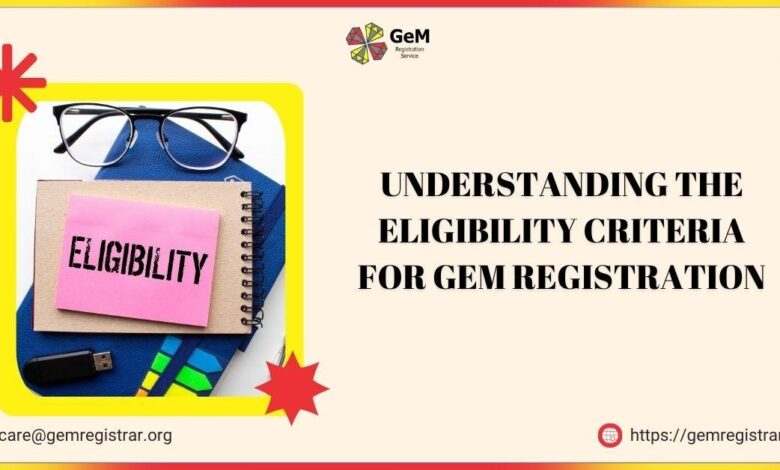Understanding the Eligibility Criteria for GeM Registration

The Government e-marketplace (GeM) has revolutionized public procurement in India, offering a transparent and efficient platform for government departments, public sector units (PSUs), and other organizations to procure goods and services. The GeM portal simplifies procurement, reduces corruption, and enhances efficiency. However, vendors must meet specific eligibility criteria to participate in this marketplace. Understanding these criteria is crucial for businesses looking to tap into this vast government market.
What is GeM Registration
GeM registration is the process by which sellers, service providers, and buyers enroll on the Government e-marketplace platform. The registration process enables businesses to showcase their products and services to government entities. For buyers, it offers a seamless way to source a wide range of goods and services. The GeM portal is designed to support the “Digital India” initiative by leveraging technology to create a transparent and efficient procurement system.
General Eligibility Requirements
To be eligible for GeM registration, a business must meet several general requirements. First and foremost, the entity must be legally recognized in India. This includes private limited companies, public limited companies, partnership firms, sole proprietorships, limited liability partnerships (LLPs), and societies registered under the Societies Registration Act, of 1860. The entity must have a valid PAN (Permanent Account Number) and GST (Goods and Services Tax) registration. These are essential to ensure that the business complies with tax regulations and can engage in financial transactions.
Specific Eligibility Criteria for Different Entities
The eligibility criteria for GeM registration can vary based on the type of entity applying. For instance, sole proprietorships must provide proof of identity and address of the proprietor, such as an Aadhaar card, passport, or voter ID. Partnership firms need to submit their partnership deed and registration certificates. Private and public limited companies must provide their Certificate of Incorporation, Memorandum of Association (MoA), and Articles of Association (AoA). LLPs are required to submit their LLP Agreement and Certificate of Incorporation.
Financial Eligibility Criteria
Financial stability is another critical criterion for GeM registration. The government needs assurance that the vendor has the financial capability to deliver goods and services as per the agreed terms. For this purpose, businesses may need to submit financial statements, including balance sheets and profit and loss accounts, for the previous financial years. Some categories of products and services may have specific turnover requirements, ensuring that only financially sound companies can participate in large or critical government projects.
Product and Service Eligibility
GeM registration is not just for any product or service; the items listed must meet certain quality and standard criteria. The products and services offered on GeM should be relevant to government procurement needs. They must comply with the technical specifications and standards set by the government. For example, electronic products might need to adhere to specific energy efficiency standards or safety certifications. Similarly, service providers must demonstrate their capability through past performance, certifications, and expertise in their respective fields.
Vendor Assessment and OEM Certification
One of the key components of the eligibility criteria is the vendor assessment and OEM (Original Equipment Manufacturer) certification. Vendors are often required to undergo an assessment by third-party agencies to verify their capabilities and compliance with GeM standards. This assessment includes evaluating the vendor’s production facilities, quality control mechanisms, and overall business operations. Additionally, for certain categories of products, vendors must have OEM certification, ensuring that the products are manufactured to specified standards and quality.
Compliance with Statutory Requirements
Compliance with statutory requirements is non-negotiable for GeM registration. Vendors must adhere to all relevant laws and regulations, including labor laws, environmental regulations, and industry-specific guidelines. For instance, manufacturers must comply with industrial safety standards, while service providers in the IT sector must adhere to data protection and privacy laws. Ensuring compliance with these regulations not only helps in gaining GeM registration but also builds trust with government buyers.
Digital and Technical Requirements
Given the digital nature of the GeM platform, vendors must possess a certain level of digital literacy and technical infrastructure. This includes having a reliable internet connection, a functional email address, and the ability to navigate and use the GeM portal effectively. Vendors should also be able to manage online transactions, upload product catalogs, and respond to bids and tenders digitally. Technical support and digital training are often provided by GeM to help vendors meet these requirements.
Additional Criteria for Service Providers
Service providers have additional criteria to meet. They must demonstrate their expertise and reliability through certifications, past performance records, and client testimonials. For example, IT service providers may need to show certifications like ISO 9001 or CMMI levels. Similarly, healthcare service providers must have relevant medical licenses and certifications. This ensures that the services offered are of high quality and meet the stringent standards expected by government entities.
The Importance of Adhering to Eligibility Criteria
Adhering to the eligibility criteria for GeM registration is crucial for several reasons. Firstly, it ensures that only genuine and capable vendors participate in the government procurement process, maintaining the integrity and quality of goods and services procured. Secondly, it helps vendors build credibility and trust with government buyers, increasing their chances of winning bids and contracts. Lastly, it ensures compliance with legal and regulatory requirements, reducing the risk of disputes and penalties.
Note: Explore gem catalouge service
Conclusion
Understanding the eligibility criteria for GeM registration is essential for businesses aiming to enter the government procurement market. These criteria ensure that only qualified and compliant vendors participate, maintaining the quality and integrity of goods and services procured by government entities. By meeting these criteria, businesses can tap into the vast opportunities offered by the Government e-marketplace, contributing to their growth and the overall efficiency of public procurement in India.



